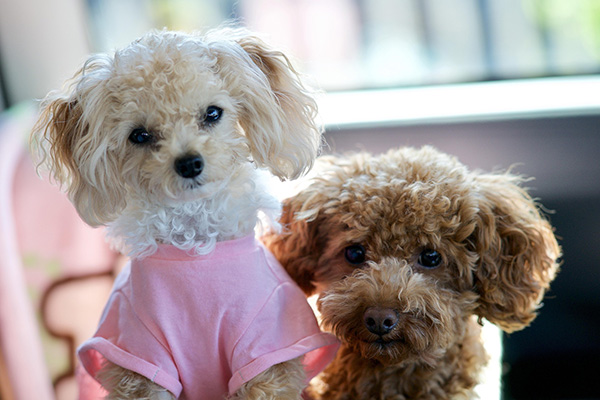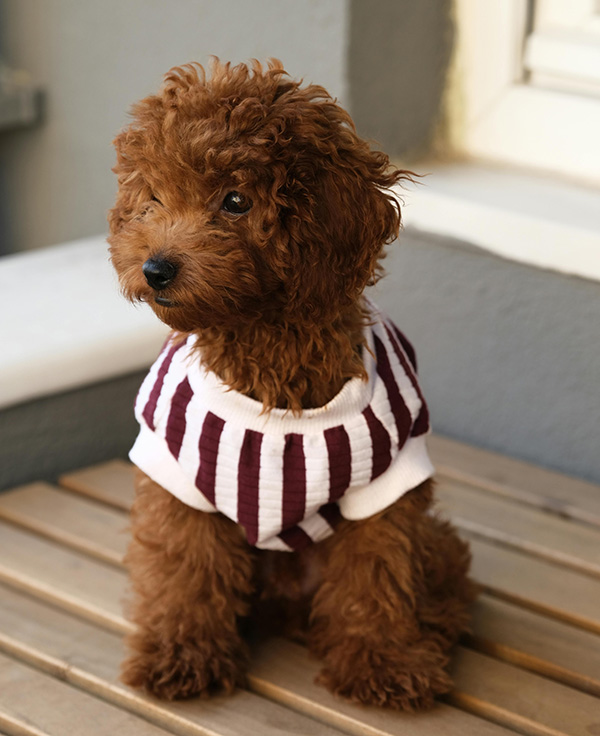Toy poodles are among the most charming and intelligent small dog breeds, beloved for their hypoallergenic coats, lively personalities, and incredible trainability. Originating from France, these pint-sized pups embody elegance and athleticism in equal measure, making them popular companions for families, singles, and seniors alike. Despite their diminutive size, toy poodles are highly energetic, thriving on mental stimulation and active play. Their loving temperament and adaptability make them well-suited for both apartment living and larger homes.
In this post, we will dive deeper into everything you need to know about this hypoallergenic breed, from care to temperament!
Breed Characteristics
Temperament | Intelligent, lively, affectionate |
Intelligence | high |
Affection/Friendliness | Very friendly and loving |
Trainability | high |
Mental Stimulation | High – obedience, tricks, puzzle toys |
Exercise Needs | Moderate – daily walks, playtime, fetch |
Apartment Living | suitable |
Family Friendly | yes |
Pet Friendly | Yes, with socialization |
Drooling Level | low |
Energy Level | moderate |
Loneliness Tolerance | Low |
Adaptability | high |
Tendency to bark | Moderate to high |
Origin
While the toy poodle's origin is unclear, standard poodles were originally bred in Germany as water retrievers. The term “poodle” derives from the German word pudelin, meaning “to splash,” reflecting their skill at retrieving game from water. Over time, the breed originated in France as a national dog of sophistication. It was further refined into smaller varieties, including miniature poodles and the toy breed to suit different lifestyles.
The American Kennel Club (AKC) officially recognized the Toy Poodle in 1887. The AKC initially recognized the Poodle as a breed and later categorized it into three size varieties: Standard, Miniature, and Toy. Toy Poodles were bred to be smaller companions, maintaining the intelligence and elegance of the Standard Poodle while adapting to lapdog status. Today, the Toy Poodle remains a popular breed in the Toy Group, admired for its intelligence, hypoallergenic coat, and affectionate nature.

Breed Overview
Height: Under 10"
Weight: 4-6 lbs
Height: Under 10"
Weight: 4-6 lbs
Breed Group
Toy
Life Span
10–18 years
Coat
Curly, dense
Coat Length
Medium
Hypoallergenic
Yes
Shedding Level
Low
size
Among the three Poodle varieties, Toy Poodles are the smallest, reaching a maximum height of under 10 inches at the shoulder. Despite their petite stature, they are well-proportioned, with a square build and an elegant, athletic frame.
In terms of weight, Toy Poodles typically range between 4 and 6 pounds, though some may be slightly heavier depending on genetics and diet. Their compact size makes them well-suited for apartment living, as they can stay happy and active without needing much space.
Personality
The Toy Poodle is a smart, energetic, and loving companion with an endearing personality. Their eagerness to please makes them highly trainable. Their energy levels, barking tendencies, and mental stimulation needs require an owner who can provide both physical activity and mental engagement.
Toy Poodles are exceptionally trainable thanks to their intelligence and enthusiasm for learning. They perform well in obedience, agility, and trick training. Since they are sensitive, positive reinforcement is the most effective training method, as they do not respond well to harsh discipline. Their ability to learn quickly makes them a great choice for first-time owners committed to consistent training.
Although Toy Poodles are small, they have a moderate to high energy level and thrive on playtime, walks, and interactive activities. Regular exercise, including short walks and indoor play, helps keep them engaged and prevents boredom. They enjoy activities like fetching, running, and even swimming, making them great companions for active families.
Toy poodles tend to be moderate to high barkers. They are alert and will often bark to signal strangers, unusual noises, or excitement. Early training can help control excessive barking, though their innate watchdog instincts make them excellent at alerting their owners. Providing enough stimulation and socialization helps keep their barking in check.
Most Toy Poodles need regular mental stimulation to avoid boredom and destructive behavior. Engaging them with puzzle toys, obedience training, trick learning, and interactive play helps keep their minds active. Without sufficient challenges, they may develop habits such as excessive barking, chewing, or restlessness.
Temperament

The toy poodle is an affectionate, intelligent, and sociable breed, making them great family dogs and loving companions. Toy Poodles develop strong attachments to their owners and crave attention, often staying close by their side. Though they may be initially reserved around strangers, they quickly become comfortable and remain naturally alert, making them great watchdogs without displaying aggression. Their friendly nature extends to other pets, as they generally get along well with dogs and cats, though they may be cautious around larger, more energetic animals. Their playful and adaptable nature makes Toy Poodles well-suited for families, singles, and seniors. However, early socialization is essential to help them grow into confident and well-behaved companions. With their affectionate demeanor and lively spirit, Toy Poodles bring joy, companionship, and a touch of elegance to any home, thriving in environments where they receive love, training, and mental stimulation.
Diet/ Nutritional needs
Toy Poodles need a nutritionally balanced diet to maintain their energy levels and overall well-being. High-quality dog food with lean protein is essential for maintaining muscle, while omega-3 and omega-6 fatty acids promote a healthy breed’s coat. Since toy poodles are small breeds, portion control helps prevent obesity, which can lead to hip dysplasia and strain vital organs. Always provide freshwater, regular vet check-ups, and proper nutrition to support life expectancy and prevent arthritis.
Activity/ Exercise
Although Toy Poodles are small, they have plenty of energy and need regular exercise to stay healthy and content. They generally require 30 to 60 minutes of daily activity, including walks, playtime, or interactive games like fetch. In addition to physical exercise, they benefit from mental stimulation through puzzle toys and obedience training, keeping their sharp minds active and engaged.
Toy Poodles are agile and excel in activities such as agility courses or canine sports, making them a great fit for active owners. Although they adjust well to apartment living, Toy Poodles thrive in settings where they get plenty of attention and opportunities for physical activity.
Appearance/ Colors
Elegant, stylish, and irresistibly charming, the Toy Poodle boasts a well-proportioned, square build with long legs and a graceful posture. Standing under 10 inches tall, this petite pup is covered in a dense, curly, hypoallergenic coat that exudes sophistication. Their expressive, dark eyes radiate intelligence, while their floppy ears frame their delicate face. Available in a stunning array of solid colors—including black, white, apricot, red, and silver—Toy Poodles captivate with their beauty. Whether flaunting a classic trim or a playful puppy cut, their luxurious coat adds to their regal allure, making them the ultimate showstoppers in any setting.
Grooming needs

The toy poodle’s signature curly coat isn’t just for show—it requires regular maintenance to keep it looking flawless. Their fast-growing, hypoallergenic coat requires professional grooming every 4 to 6 weeks to prevent matting and maintain a neat appearance. Daily brushing helps prevent tangles, while routine ear cleaning, nail trimming, and dental care contribute to their overall well-being. Whether styled in a puppy cut, teddy bear trim, or the elegant continental clip, Toy Poodles always turn heads. Proper grooming keeps their coat soft, clean, and manageable—making them as effortlessly chic as they are adorable.
Adaptability
The Toy Poodle is the perfect blend of elegance and adaptability, thriving in almost any environment. This intelligent breed adapts easily to both spacious homes and compact apartments. Their small size makes them well-suited for city living, while their playful personality complements active families. Highly trainable and eager to please, Toy Poodles quickly adapt to routines, travel well, and bond deeply with their owners. They thrive on companionship and are happiest in affectionate homes where they aren’t left alone for extended periods. With the right care and engagement, Toy Poodles flourish anywhere, bringing joy everywhere they go.
Trainability
The Toy Poodle is among the most trainable of the Poodle varieties, thanks to its sharp intelligence and strong desire to please. Originally bred alongside Standard Poodles and water retrievers, this national dog excels in obedience training and dog sports, as well dog sports competitions. Toy Poodle puppies pick up commands quickly and respond well to positive reinforcement, such as treats and praise.
Early socialization helps prevent separation anxiety, ensuring they interact well with other dogs and small children. Regular training prevents boredom and supports their relatively healthy breed status. While toy poodles are energetic, they need long walks and mental challenges to avoid health issues like hip dysplasia or ear infections. With consistent training and patience, they become wonderful companions.
Life expectancy
The Toy Poodle typically lives between 12 to 15 years, with some exceeding this range when given proper care. Their long lifespan is due to their small size and generally good health, though they can be susceptible to certain genetic conditions. Routine veterinary check-ups, a nutritious diet, regular exercise, and mental enrichment all play a role in ensuring a long and happy life.
Cost
The price of a Toy Poodle varies based on factors such as lineage, breeder reputation, location, and whether the dog is meant for companionship or show. On average, acquiring one from a reputable breeder typically costs between $1,000 and $3,000. Show-quality or champion-bloodline Toy Poodles often command even higher prices, sometimes exceeding $5,000.
Adoption is a more budget-friendly option, with fees typically between $200 and $500 through shelters or rescue organizations. However, availability may be more limited, and you may not have access to detailed health or lineage information.
Potential Health Issues

The Toy Poodle breed is considered a relatively healthy dog, but like all poodle breeds, they are prone to certain health issues. Understanding these risks helps owners take preventive measures.
Luxating Patella (Kneecap Dislocation)
Luxating patella is common in small breeds where the kneecap shifts out of place, leading to occasional limping, trouble standing, or a distinctive "skipping" gait. While mild cases may not require treatment, weight management, and physical therapy can help reduce discomfort. Surgery may be required in severe cases to stabilize the joint and improve mobility.
Progressive Retinal Atrophy (PRA)
Progressive Retinal Atrophy (PRA) is an inherited eye condition that leads to gradual vision loss and, eventually, blindness. Early signs may include trouble seeing in dim lighting, bumping into objects, or hesitation to enter dark areas. While there is no cure, antioxidant-rich diets and routine vet check-ups can help slow progression. Despite vision loss, Toy Poodles can adapt well to a stable home environment.
Legg-Calvé-Perthes Disease
This condition impacts the hip joint by restricting blood flow, which results in bone deterioration. It often appears as limping, muscle loss, or difficulty using one of the hind legs. Mild cases may be managed with rest and anti-inflammatory medication, but severe cases often require surgery to remove the affected bone and allow pain-free movement.
Dental Issues
Toy Poodles are susceptible to periodontal disease due to their small mouths, which can result in bad breath, gum infections, and tooth loss. Symptoms include tartar buildup, red gums, and difficulty eating. To prevent dental issues, owners should brush their Poodle’s teeth daily with a dog toothbrush, schedule regular professional cleanings, and provide dental chews or toys to reduce plaque buildup.
Epilepsy
Some Toy Poodles may develop epilepsy, a neurological condition that triggers seizures. Affected dogs may experience sudden shaking, muscle twitching, or temporary confusion. Although epilepsy cannot be cured, it can be controlled with veterinarian-prescribed anti-seizure medications. Owners should also identify and avoid possible triggers such as stress, dietary changes, or flashing lights.
Hypoglycemia (Low Blood Sugar)
Young Toy Poodles, especially puppies, are at risk of hypoglycemia, which can cause lethargy, shaking, or even collapse. This condition is dangerous if untreated but can be prevented by feeding small, frequent meals throughout the day. Applying honey or corn syrup to the gums in emergencies can help raise blood sugar levels quickly.
Addison’s Disease (Hypoadrenocorticism)
This severe hormonal disorder occurs when the adrenal glands do not produce enough cortisol, resulting in symptoms like weakness, vomiting, and weight loss. If not treated, Addison’s disease can become life-threatening. Affected dogs require lifelong hormone replacement therapy, which includes daily medication or monthly injections. Regular blood tests help monitor adrenal function and prevent severe symptoms.
Cushing’s Disease (Hyperadrenocorticism)
Cushing’s disease is the opposite of Addison’s disease, where the body produces too much cortisol. Symptoms include increased thirst, excessive hunger, hair loss, and a pot-bellied appearance. Treatment varies based on the underlying cause and may involve medication or surgery if an adrenal tumor is detected. Early diagnosis through routine vet visits can help manage the condition effectively.
Ear Infections
The floppy ears of Toy Poodles can retain moisture, increasing the risk of bacterial and yeast infections. Signs of an infection include excessive scratching, head shaking, redness, and a foul odor from the ears. To prevent infections, owners should clean their Poodle’s ears weekly with a vet-approved cleaner and ensure they stay dry after baths or swimming.
Heart Disease (Mitral Valve Disease - MVD)
As Toy Poodles age, they may develop mitral valve disease (MVD), a common heart condition that leads to poor circulation. Symptoms include coughing (especially at night), difficulty breathing, and fatigue. While there is no cure, early diagnosis can help manage the condition with medications, a low-sodium diet, and moderate exercise.
